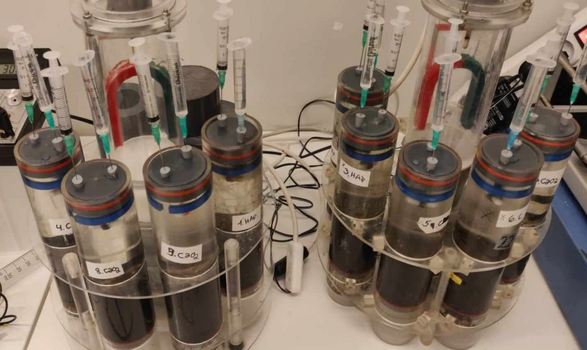Many water bodies suffer from eutrophication due to excessive nutrients, leading to massive algal growth, anoxic waters, and bottom sludge. Traditional remediation methods like mechanical sludge removal or oxygen injection are costly. A new approach by Söll GmbH involves using granulated calcium peroxide to induce aerobic oxidation of organic matter, showing greater effectiveness than expected from lab tests.
Cable bacteria, discovered at Aarhus University, connect sulfide oxidation in anoxic sediment with oxygen reduction at the surface over centimeter-distances by conducting electrons via periplasmic wires. This long-distance electron transport (LDET) extends the influence of oxygen deeper into the sediment aiding bioremediation of contaminated sites.
Preliminary analyses show the presence of cable bacteria in some calcium peroxide-treated lakes, suggesting a potential synergy. This research project aims to test if cable bacteria enhance the effect of calcium peroxide by propagating its effect deeper into anoxic sediment. If successful, we will explore methods to combine cable bacteria with calcium peroxide to improve lake restoration efficiency.

The CEM researchers study the newly discovered cable bacteria, which in chains form centimeter long electrical wires. By doing so the cable bacteria can connect various biochemical processes with electric currents and are a particularly prominent example of the rapidly growing research field of electromicrobiology. CEM is located at Aarhus University, Section for Microbiology and combines expertise in the application and development of methods in microbiology, molecular biology, electrochemistry, measuring technology and nanoscience.
Söll GmbH specializes in the ecological maintenance and treatment of water, producing environmentally friendly products for various water bodies and fish food. The company holds numerous patents, emphasizing significant investment in research and development.